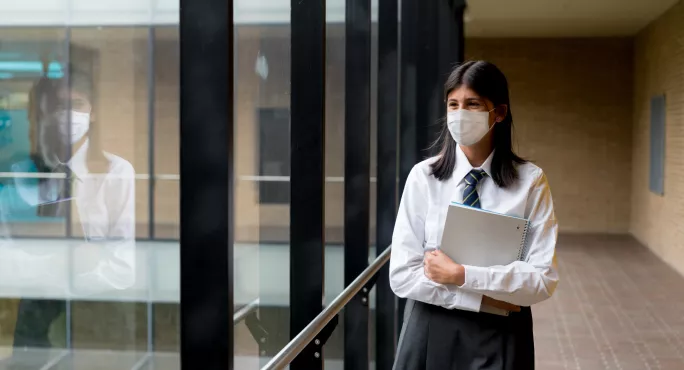A top Department for Education official admitted that we are still “clearly” in the grip of the pandemic rather than getting back to normal.
The former education secretary Gavin Williamson previously said the start of the autumn term would mark “the point when our focus can shift away from the disruption of Covid and on to learning, enrichment and recovery”.
But, speaking at a conference for education recovery today, Graham Archer, director for education recovery at the DfE, warned that “we’re still clearly in the pandemic rather than on the way out of it”.
Mr Archer was questioned by Christian Wakeford MP at the Westminster Education Forum on whether he believed there was enough funding for education recovery and what else could be achieved if there was more.
“It’s risky to say one way or another whether there’s enough money,” answered Mr Archer.
He added that there was “certainly a lot” and that “we can do a lot of really good things with it,” but ”we don’t pretend that we know from Whitehall what is right for children in particular schools”.
In October 2021, chancellor Rishi Sunak revealed an additional £1.8 billion will be invested in education recovery over the next three years, taking the total Covid catch-up investment to almost £5 billion.
However, this was far short of the £15 billion former recovery commissioner Sir Kevan Collins said would be needed to ensure pupils would catch up on lost learning.
Mr Archer said the funding meant government could “change the way in which schools operate” through the use of tutoring, and raise the quality of teaching “for a significant period of time”.
He added that “the money which is in schools directly enables them to pivot and sharpen the way in which they drive their recovery practice”.
Two ‘central principles’ to recovery
Mr Archer said there were two “central principles” to specific recovery activity. The first was “evidence-based action” that would involve “putting in place, supporting and funding things proven to drive education progress and recovery”.
Secondly, Mr Archer said: “We don’t pretend that we know from Whitehall what is right for children in particular schools, why would we imagine that we can?”
“So there’s a good deal of discretion here about both: which children are supported by measures and around flexibility in some aspects of our programme as to what is done and what is supported within schools to help children to catch up.”
School recovery strategies
A research report looking at learning recovery in 2020-21 published today by the DfE revealed that both primary and secondary school leaders reported an increase in disparities in pupils’ social, emotional and academic progress, “with pupils having increasingly complex and variable needs”.
It also showed that pupils from disadvantaged backgrounds who did not attend school or engage well online during homeschooling seem to have been most profoundly impacted by the Covid-19 pandemic.
The report also found externally developed interventions (such as the National Tutoring Programme) were less popular than those developed internally: “leaders believed that more tailored approaches, fine-tuned by the teachers to meet specific learning needs, were more effective”.
Mr Archer will appear alongside Robin Walker MP, minister of state for school standards, in front of the Commons Education Select Committee tomorrow for an accountability hearing for the government’s catch-up programme.




